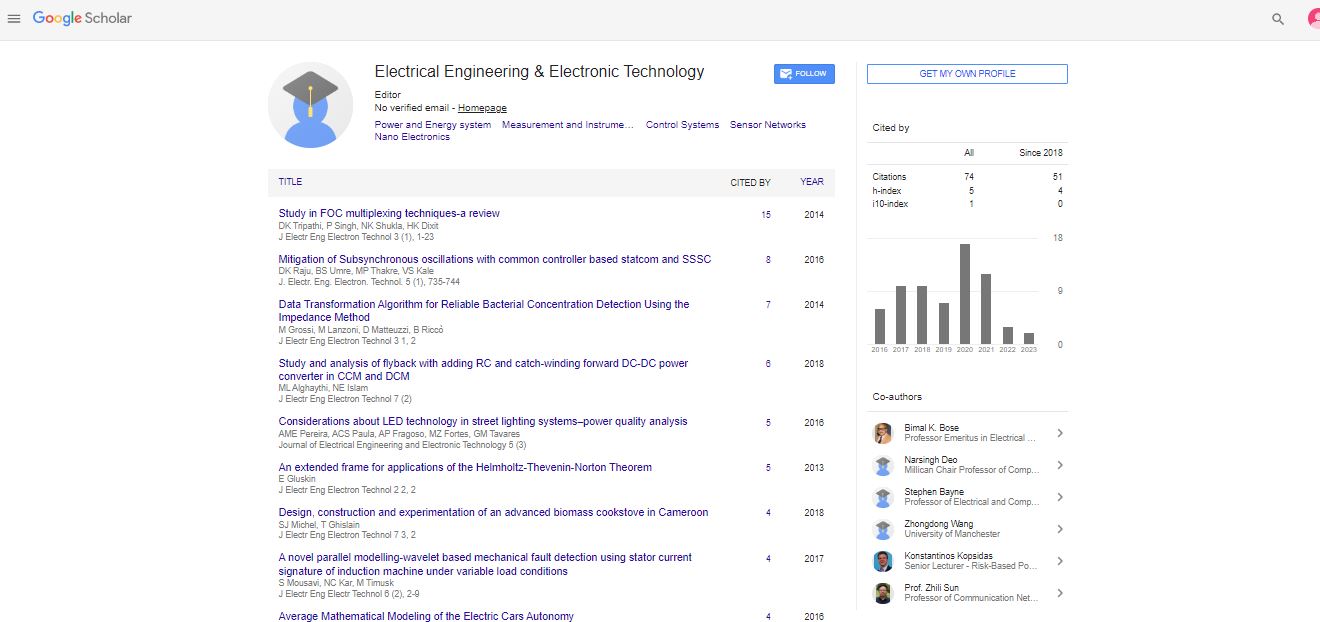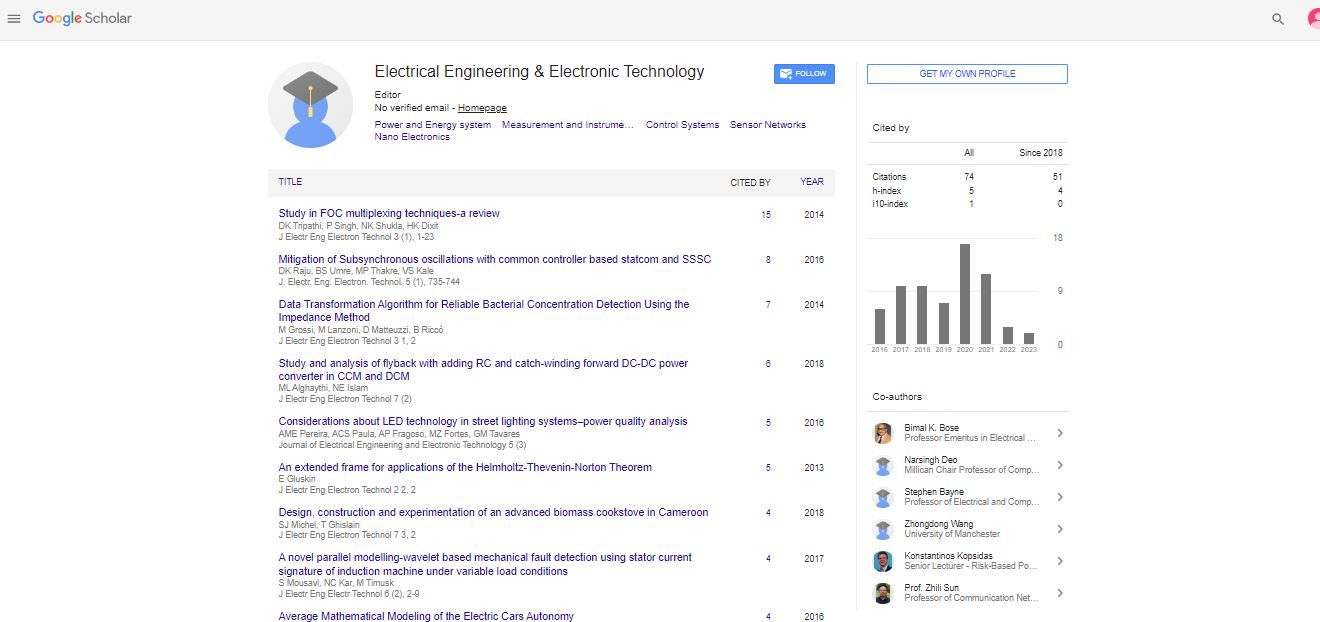Perspective, J Electr Eng Electron Technol Vol: 13 Issue: 4
Control Systems for Green Technologies: Optimizing Efficiency in Renewable Energy
Jing Wang*
1Department of Electrical Engineering, Tsinghua University, Beijing 100084, China
*Corresponding Author: Jing Wang,
Department of Electrical Engineering,
Tsinghua University, Beijing 100084, China
E-mail: wangj@gamil.com
Received date: 21 June, 2024, Manuscript No. JEEET-24-143437;
Editor assigned date: 24 June, 2024, Pre QC No. JEEET-24-143437 (PQ);
Reviewed date: 8 July, 2024, QC No. JEEET-24-143437;
Revised date: 15 July, 2024, Manuscript No. JEEET-24-143437 (R);
Published date: 22 July, 2024, DOI: 0.4172/2325-9838.1000979
Citation: Wang J (2024) Control Systems for Green Technologies: Optimizing Efficiency in Renewable Energy. J Electr Eng Electron Technol 13:4.
Description
In the activity of a sustainable future, renewable energy technologies are paramount. From wind turbines to solar panels, these green technologies are revolutionizing how we generate and utilize energy. However, to maximize their efficiency and reliability, sophisticated control systems are essential. These systems play an important role in optimizing the performance of renewable energy sources, ensuring they contribute effectively to a greener planet.
Enhancing solar power efficiency
Solar energy is one of the most widely adopted forms of renewable energy. Solar panels, or Photovoltaic (PV) systems, convert sunlight into electricity. Control systems are integral to enhancing their efficiency and performance. Modern solar power systems employ embedded control systems to adjust the orientation of solar panels. This adjustment, known as solar tracking, allows panels to follow the sun’s path across the sky, thereby maximizing exposure and energy capture. Control systems process data from light sensors and GPS modules to optimize the angle of panels throughout the day, leading to significant increases in energy production.
Moreover, control systems manage the operation of inverters, which convert the Direct Current (DC) generated by solar panels into Aternating Current (AC) suitable for the grid. Advanced control algorithms ensure that these inverters operate at peak efficiency, minimizing energy losses and improving the overall performance of solar power systems.
Optimizing wind turbine operations
Wind power, another major renewable energy source, relies on wind turbines to convert kinetic energy from wind into electricity. Control systems in wind turbines are designed to optimize their operation and ensure they function efficiently under varying wind conditions. Embedded control systems in wind turbines monitor wind speed, direction and turbine performance in real-time. Based on this data, they adjust the pitch of the turbine blades and the turbine’s yaw angle to align with the wind direction. This dynamic adjustment ensures that the turbine operates at its optimal efficiency, capturing the maximum amount of wind energy while avoiding mechanical strain. Furthermore, control systems play a different role in maintaining the safety and longevity of wind turbines. They can detect potential faults or anomalies in the turbine’s components and initiate preventive measures or shut down the system if necessary. This proactive approach minimizes downtime and maintenance costs, ensuring a reliable and efficient wind power generation.
Integrating energy storage systems
Energy storage is a key component of a stable and reliable renewable energy infrastructure. Control systems are essential for managing and optimizing these storage systems, such as batteries and pumped hydro storage. In battery storage systems, control algorithms regulate the charge and discharge cycles to maximize the lifespan and efficiency of the batteries. They also balance the energy storage with the energy demand from the grid, ensuring a stable supply of power even when renewable energy sources are intermittent. For pumped hydro storage, control systems manage the flow of water between reservoirs to store and release energy as needed. By optimizing the timing and volume of water transfers, these systems enhance the overall efficiency of energy storage and contribute to a more stable energy supply.
Smart grid integration
The integration of renewable energy sources into the power grid requires advanced control systems to manage the flow of electricity and maintain grid stability. Smart grids, which incorporate control systems and communication technologies, facilitate the efficient distribution of electricity from various renewable sources. Control systems in smart grids monitor real-time data on energy production and consumption, allowing for dynamic adjustments to grid operations. They balance supply and demand, optimize energy distribution, and ensure that renewable energy sources are effectively integrated into the grid. This capability is important for accommodating the variable nature of renewable energy and maintaining a stable and reliable power supply.
The future of control systems in renewable energy
As renewable energy technologies continue to advance, the role of control systems will become increasingly important. Future developments may include more sophisticated algorithms, enhanced data analytics, and greater integration with Artificial Intelligence (AI) and machine learning. These advancements will further improve the efficiency and reliability of renewable energy systems, enabling a more sustainable and strong energy infrastructure. Control systems will be at the heart of this evolution, driving innovation and helping to meet the growing global demand for clean energy. Control systems are indispensable in optimizing the efficiency of renewable energy technologies. From enhancing solar power performance to optimizing wind turbine operations and integrating energy storage, these systems play an important role in maximizing the benefits of green technologies. As we move towards a more sustainable future, the continued advancement of control systems will be key to unlocking the full potential of renewable energy and achieving a greener planet.
 Spanish
Spanish  Chinese
Chinese  Russian
Russian  German
German  French
French  Japanese
Japanese  Portuguese
Portuguese  Hindi
Hindi 
